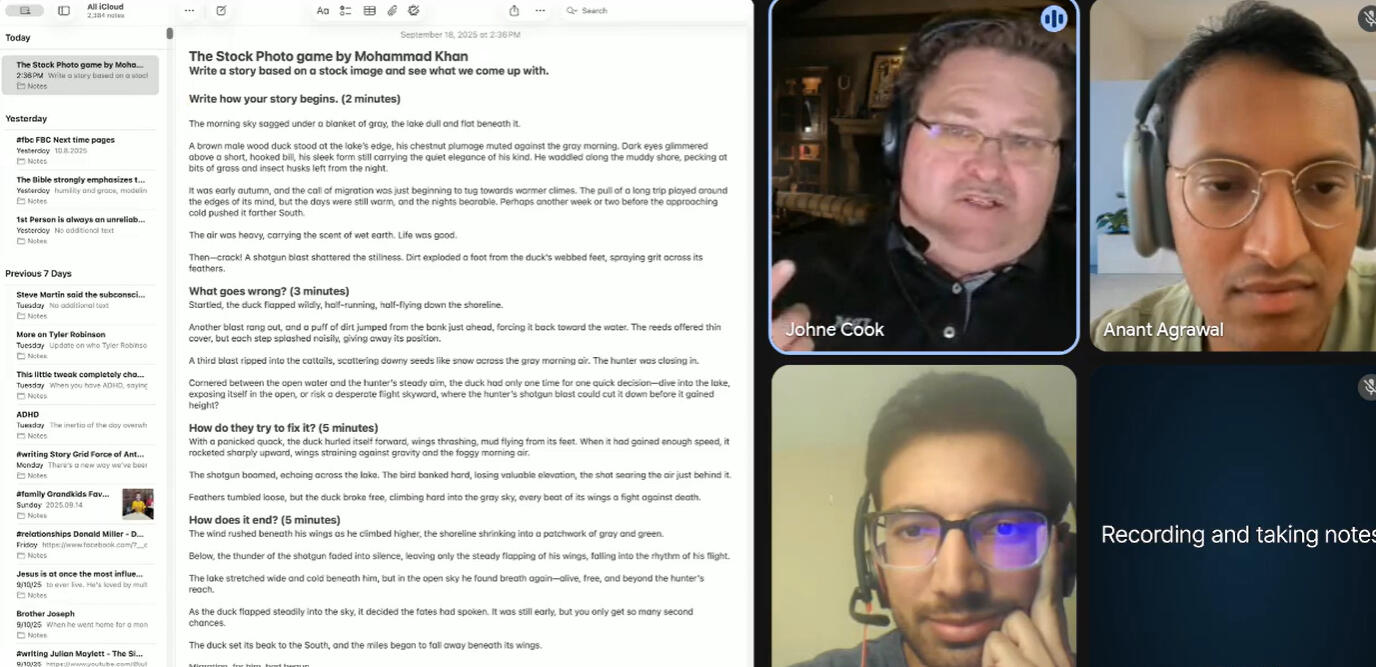Write like yourself
Frameworks made you generic. Fiction will uncover what makes you different.
30-minute call • I'll share the approach • You get honest feedback
"I now think about transformation in everything I write"
— Ceres Chua, Money Psychologist | Financial CoachTested with professionals from finance to software to policy making
You've Been Taught to Write Like Everyone Else
Every LinkedIn post. Every framework. Every "proven template." They all promise to make your writing better.Instead, they made you invisible.When your LinkedIn posts look like everyone else's, you lose:
- Inbound opportunities (they go to whoever stands out)
- Authority positioning (you're just another voice in the crowd)
- Professional differentiation (clients can't tell you apart from competitors)On platforms where writing IS your brand, Generic = invisible.
You Already Have a Distinctive Voice. You Just Can't See It.
You make unconscious choices every time you communicate:- Which details to emphasize
- How to structure information
- When to be direct vs. nuancedBut you've been trained to OVERRIDE these instincts with formulas.Fiction exercises bypass that override.
No frameworks to follow. No "correct" way to do it.
Just 15 minutes that reveal how your mind naturally works.

If you want shortcuts, this isn't for you.
Most writing courses promise shortcuts: "5-minute templates" or "AI will do it for you."This cohort doesn't promise easy. It promises real.5 weeks. 15 minutes of writing per session. Pattern recognition that transfers to everything you write.If you're willing to do the work, you'll discover abilities you didn't know you had.No frameworks to follow -> You discover your patterns, not learn someone else's
Low-stakes creativity -> Fiction removes the pressure of "correct" professional writing
Pattern recognition, not technique -> You see what you already do naturally
Frequently Asked Questions
Can't I just use AI?
Sure. But AI writes to the average.It smooths out what makes your voice distinct. Your AI-generated writing sounds like everyone else's AI-generated writing.If you want to stand out, you need to know your natural patterns first, then you can use AI without losing your voice.
I've never written fiction before.
Will this work for me?
Yes! 92% people who've done these exercises weren't fiction writers.
They discovered patterns in their first 15-minute story.
How does fiction help my business writing?
Fiction removes the pressure to sound "professional."Your natural voice emerges.Once you see your patterns in fiction, you can use them intentionally in emails, presentations, proposals, anything you write.
What if I don't have time for homework?
Everything happens during the weekly session. 15 minutes of writing, 15-20 minutes of reflection. 30 min of application. That's it.
Why fiction instead of just writing naturally about my work?
Because "work writing" triggers your professional override system.The moment you think "email to client" or "LinkedIn post," you default to templates you've been trained to use.Fiction bypasses that. When I say "write about a duck," you can't fall back on formulas. Your brain has to solve the problem naturally.THAT'S when your real patterns show up, the ones you use when you're not performing professionalism.
Is this just creative enrichment?
No. This is pattern recognition training that transfers to professional communication.One participant independently applied it to her finance coaching. Another recognized his decision-making patterns across fiction and client work.
What if I discover my natural voice isn't good?
If you communicate successfully in ANY context, explaining technical concepts to non-experts, onboarding new team members, persuading stakeholders, you already have effective patterns.This cohort makes them conscious so you can use them intentionally.The "bad writing" you're worried about usually comes from trying to sound professional using someone else's frameworks.When you write naturally (like you'd explain something to a friend), your real competence shows up.
Ready to write like yourself?
Here's what happens next:30-minute conversation about your writing struggles
I'll share how the exercises work
We'll figure out if this approach fits what you need
Why I Built This
For two years, I struggled to see how fiction writing (my thing) could help professionals communicate better. Everyone kept telling me: "That's interesting, but what's the business application?"Most professionals see writing as necessary work—something to get through, not enjoy.But when the pressure's off and you're just writing fiction for 15 minutes, something changes. People stop performing 'professionalism' and start enjoying the process again.
That's when the real discovery happens.When you're not trying to sound professional or follow someone else's framework, your natural patterns emerge. And those patterns transfer to everything you write.
The best learning happens when the pressure's off.
I've written 164 short stories and used the same pattern recognition to land $500K in contracts.I've helped engineers, strategists, and consultants discover they already know how to organize information compellingly—they just needed a safe space to see it.This cohort is that space. Fiction exercises where there's no "correct" answer. Just you, 15 minutes, and discovering how you naturally think.If you're tired of forcing yourself into templates, fighting for formal language, or second-guessing every word—let's talk.— Mohammad

Your Instructor: Mohammad Khan
© Mohammad Khan. All rights reserved.